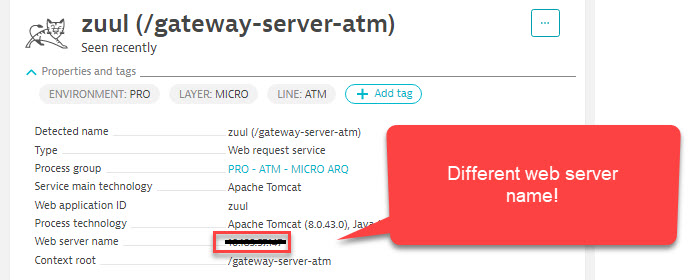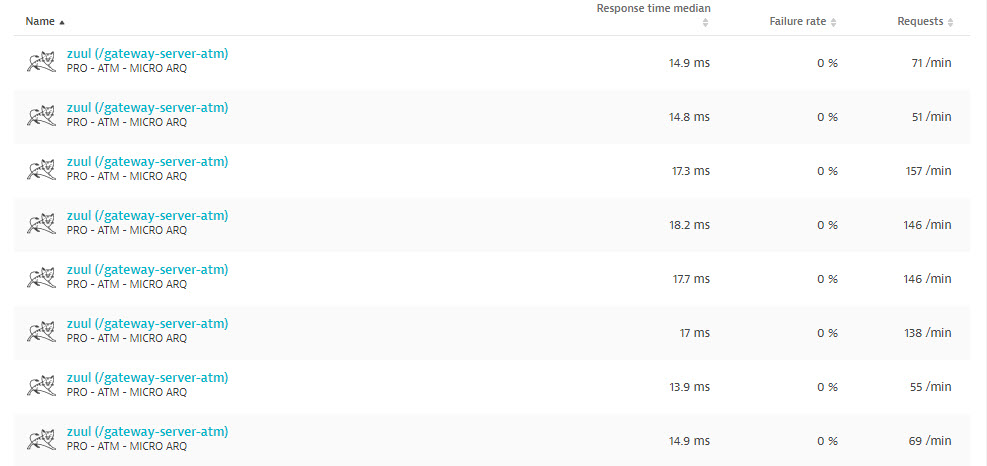- Dynatrace Community
- Ask
- Real User Monitoring
- Re: Merge services via API
- Subscribe to RSS Feed
- Mark Topic as New
- Mark Topic as Read
- Pin this Topic for Current User
- Printer Friendly Page
- Mark as New
- Subscribe to RSS Feed
- Permalink
19 May 2020 08:00 AM
Hi all,
we want to merge several atomatic detected services via the new Dynatrace API - Service detection rules API into one single service.
We've several Tomcat services with the same context-path and the same Web application ID but with different Web Server Name.

With this scenario Dynatrace detects one service for each web server name:

How can I, via API, tell Dynatrace to not use the Web Server Name in the service detection (only use the context-path and the Web application ID) to merge all the default detected services in one service?
Was this possible? How can we do that?
Regards, Josep Maria
Solved! Go to Solution.
- Labels:
-
application monitoring
-
java
- Mark as New
- Subscribe to RSS Feed
- Permalink
19 May 2020 10:11 AM
This is a perfect use case for the service detection API.
With the API you can create a rule that will modify the detected service properties (Web Application ID / Context Root or Web Server Name) and you can specify the scope of the rule.
The modifications are either an override with a static value or some sort of extraction / modification of the detected value. You cannot push an extracted value from one property to another - for example use part of application id for context root.
First I recommend to read two blog posts regarding this feature by @Michael K.:
https://www.dynatrace.com/news/blog/new-dynatrace-api-enhances-automatic-service-detection/
https://www.dynatrace.com/news/blog/new-dynatrace-api-enhances-automatic-service-detection-part-2/
See the following simple example in one of our customer's cases - this example sets the server name to the values up to first character "m" for each web request service where the server name starts with xxx01. Other service properties - Context Root and Application ID are left untouched in this example. I believe this is almost exactly your case.
{
"type": "FULL_WEB_REQUEST",
"metadata": {
"configurationVersions": [
0
],
"clusterVersion": "1.188.88.20200313-114149"
},
"managementZones": [],
"name": "XXX Merge",
"description": "XXX Merge Rule\n",
"enabled": true,
"conditions": [
{
"attributeType": "SERVER_NAME",
"compareOperations": [
{
"type": "STARTS_WITH",
"negate": false,
"ignoreCase": true,
"values": [
"xxx01"
]
}
]
}
],
"applicationId": null,
"contextRoot": null,
"serverName": {
"transformations": [
{
"type": "BEFORE",
"delimiter": "m"
}
],
"valueOverride": null
}
}There are several properties you can use. Without exactly knowing your environment and how your services have been automatically detected, it is difficult to suggest a rule.
Please see the docs for all options:
https://www.dynatrace.com/support/help/dynatrace-api/configuration-api/service-api/detection-rules/
I agree this is complex, the docs are lacking some details such as all possible attributes for operations. And more examples will be definitely appreciated by the community :-).
Cheers
Julius
- Mark as New
- Subscribe to RSS Feed
- Permalink
19 May 2020 10:27 AM
I believe in your case you will probably want to just override the server name value. So it will likely look like this. You may want to add some additional conditions for the scope of this rule :
{
"type": "FULL_WEB_REQUEST",
"metadata": {
"configurationVersions": [
0
],
"clusterVersion": "1.188.88.20200313-114149"
},
"managementZones": [],
"name": "ZUUL Merge",
"description": "ZUUL Merge Rule\n",
"enabled": true,
"conditions": [
{
"attributeType": "APPLICATION_ID",
"compareOperations": [
{
"type": "EQUALS",
"negate": false,
"ignoreCase": true,
"values": [
"ZUUL"
]
}
]
}
],
"applicationId": null,
"contextRoot": null,
"serverName": {
"valueOverride": "ZUUL server"
}
}
- Mark as New
- Subscribe to RSS Feed
- Permalink
19 May 2020 03:00 PM
Hi @Julius L.,
thanks for your response!!! one more question, If we've one rule like this and we monitor other zuul processes, the serverName for these new monitored processes will be ZUUL server and these newservices will be merged with the existing ones, rigth?
So, with this approach the maintenance will be lower.
Regards! Josep Maria
- Mark as New
- Subscribe to RSS Feed
- Permalink
21 May 2020 08:56 AM
Hi @Josep Maria C.,
for the full web request, the services will be merged only within a process group. So if you have your process groups correctly, the rule will apply automatically. So if the processes have different process groups, the services will not merge. If the newly added server falls into the same process group, the service will be automatically merged.
This is exactly why I prefer these rules over existing merge service functionality which is static. Typically you don't have to worry about any maintenance when scaling your applications.
Cheers
Julius
- Mark as New
- Subscribe to RSS Feed
- Permalink
21 May 2020 09:28 AM
Hi @Julius L.,
thanks for your quick and accurate responses! All clear and all applied 🙂
Regards, Josep Maria
Featured Posts
